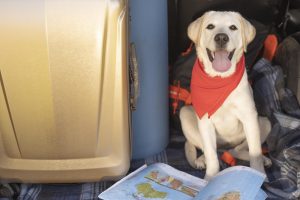What documents are required for flying with pets?
— International veterinary certificate. It should be issued based on a Veterinary Certificate and registered with the Veterinary Dervice of the border control point.
— Certificate from the RKF club stating that your pet does not have breeding value, and other documents required by the veterinary authorities of the country of arrival or transit.
— If you are travelling to Asia or Africa, you may need to get additional vaccinations and obtain the relevant certificate.
— Since 2006, when importing an animal into the European Union from a non-EU country, dogs, cats, and domestic ferrets must be equipped with a microchip or have a distinct unique mark. For clarification of the complete set of necessary documents, we recommend contacting the airport veterinary service and the consulate of the country of arrival or transit.
Most international airlines only accept documents in English.
It is also worth remembering that many countries have restrictions on the import of certain types of animals. For example, for over ten years, it has been prohibited to import fighting dog breeds into Denmark, Spain, Italy and Sweden.
How to prepare the necessary documents?
Study the requirements for the import of animals in each of the countries you are travelling to.
This is an extremely important point, as different countries have different regulations.
- Microchip
You must get your pet microchipped before, or at the same time as, their rabies vaccination. If you do not, they’ll need to be vaccinated again.
Airlines and train companies in the EU can read microchips that meet ISO standards. ISO 11784 standards are recognized for dogs and cats, and ISO 11785 standards — for ferrets.
- Get vaccinated against rabies
Unfortunately, the requirements for pets from Russia are quite strict. Some countries require a three-week quarantine, others require a blood test to finally ensure that the animal is free from rabies virus.
Please note: you should get a rabies vaccination only after microchipping, otherwise it will not be considered.
- Obtain the Veterinary Certificate Form No. 1
This document is required for passing veterinary control at the border and, when moving your pet abroad. Please note: the veterinary certificate is only valid for 5 days from the date of issue.
If you are heading to the CIS countries (Armenia, Ukraine, Moldova, Georgia, Kyrgyzstan, Tajikistan, Turkmenistan, Azerbaijan and Uzbekistan), then your preparation ends here.
To pass through the border you will need:
- Veterinary passport with all vaccinations indicated (rabies vaccination must be done no more than 12 months before the trip).
- Veterinary certificate form No. 1.
- Your pet.
For the export of animals to the countries of the Customs Union — Belarus and Kazakhstan, instead of a veterinary certificate, it is necessary to obtain a Customs Union form № 1 certificate. The requirements for its issuance are absolutely the same as for a regular veterinary certificate.
If your journey takes you further, to Europe, the USA or Asia, then you will need to obtain an International Veterinary Certificate at the border.
4. Get an International Veterinary Certificate
They issue a certificate at the veterinary checkpoints when crossing the border. It is issued in English or German, depending on the country of travel. In this document, all the pet’s and its owner’s details are specified.
To obtain an international veterinary certificate, you must provide:
- Veterinary certificate form No. 1.
- Veterinary passport with the date of animal vaccination indicated.
- Veterinary history report, issued on the official letterhead of the veterinary station and signed by its chief veterinarian. The report should include information about the treatment of the animal against echinococcus (no earlier than 120 hours and no later than 24 hours before the animal is imported into the EU) with the name of the drug and its manufacturer, dates and times of treatment.
- Your pet.
Contact details of veterinary clinics at Moscow airports:
“Vnukovo” – tel.: 436-83-63
“Domodedovo” – tel.: 323-85-74
“Sheremetyevo-1” — tel.: 578-62-44
“Sheremetyevo” (Terminal 2) – tel.: 578-76-53
One of the most unpleasant requirements, which, nevertheless, is found in the rules of many countries, is castration or sterilization. If your pet has no value for the breed, then for entry into some countries, it must be sterilized.
